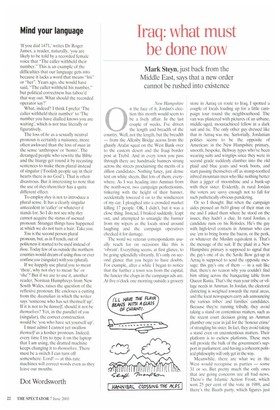Mind your language
'If you dial 1471,' writes Dr Roger James, a reader, naturally, 'you are likely to be told by a recorded female voice that "The caller withheld their number." This is an example of the difficulties that our language gets into because it lacks a word that means "his" or "her". Years ago, she would have said, "The caller withheld his number," but political correctness has taboo'd that way out. What should the recorded operator say?'
What, indeed? I think I prefer 'The caller withheld their number' to 'The number you have dialled knows you are waiting', which is not true literally or figuratively.
The loss of he as a sexually neutral pronoun is certainly a nuisance, more often awkward than the loss of man in the sense `anthropos' or `homo'. The deranged people who rewrite the Bible and the liturgy get round it by recasting sentences to make them plural instead of singular (Foolish people say in their hearts there is no God'). That is often disastrous. But it interesting to note that the use of they/them/their has a quite different effect.
To employ they is not to introduce a plural sense. It has a clearly singular antecedent in 'caller' or whatever it stands for. So I do not see why they cannot acquire the status of asexual pronoun. Stranger things have happened at which we do not turn a hair. Take you.
You is the second person plural pronoun, but, as in French, out of politeness it started to be used instead of thou. Today few of us outside the northern counties would dream of using thou or ever confuse you (singular) with you (plural).
If we happily use plural you to mean 'thou', why not they to mean 'he' or 'she'? But if we are to use it, another reader, Norman Humphreys from New South Wales, raises the question of the reflexive pronoun. He encloses a cutting from the Australian in which the writer says 'someone who has set themself up'. If it is not to be himself, should it not be themselves? Yet, in the parallel of you (singular), the correct construction would be 'you who have set yourself up'.
I must admit I cannot yet swallow themself as a kosher pronoun. Indeed, every time I try to type it on the laptop that I am using, the dratted machine keeps changing it to themselves. There must be a switch I can turn off somewhere. Lord! — at this rate machines will correct words even as they leave our mouths.
Dot Wordsworth










































































 Previous page
Previous page